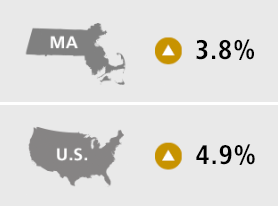State economy outperforms expectations in Q3, UMass Journal reports
Reduced spending and labor supply constraints are expected to slow growth in 2024
November 2023

» Download the detailed report
In the third quarter of 2023, Massachusetts real gross state product (GDP) increased at a 3.8 percent annualized rate, according to MassBenchmarks, while U.S. GDP increased at a 4.9 percent annualized rate, according to the U.S. Bureau of Economic Analysis (BEA). In the second quarter of 2023, Massachusetts GDP increased at a 3.6 percent annualized rate according to MassBenchmarks while U.S. GDP increased at a 2.1 percent annualized rate according to the BEA.
 The strong performance in the third quarter came as a surprise as in July MassBenchmarks was projecting an annualized rate of growth of less than one percent in the third quarter (+0.7 percent) and the Wall Street Journal Economic Forecasting Survey forecast a 0.6 percent rate of growth for the U.S. Vigorous job creation and robust consumer spending during the summer months accounted for the unexpectedly strong growth, in addition to a meaningful uptick in inventories. Growth is expected to slow substantially in the fourth quarter and into 2024.
The strong performance in the third quarter came as a surprise as in July MassBenchmarks was projecting an annualized rate of growth of less than one percent in the third quarter (+0.7 percent) and the Wall Street Journal Economic Forecasting Survey forecast a 0.6 percent rate of growth for the U.S. Vigorous job creation and robust consumer spending during the summer months accounted for the unexpectedly strong growth, in addition to a meaningful uptick in inventories. Growth is expected to slow substantially in the fourth quarter and into 2024.
Payroll employment grew by 1.7 percent on an annualized basis in the third quarter in both Massachusetts and the U.S., a notable pace given the efforts of the Fed to slow the economy. It is unlikely that this pace can be maintained in the final quarter of 2023. Nationally, payroll growth slowed in October and state estimates for October will be available in the coming weeks.
In Massachusetts, there appears to be very little capacity to sustain recent job growth. Unemployment rates in the state are at historic lows, 2.6 percent in September as compared to 3.8 percent for the U.S. The broader U-6 unemployment rate measure, which also includes involuntary part-time workers and persons marginally attached to the labor force, is close to an historic low in Massachusetts (5.4 percent). The number of part-time workers who want full-time work is roughly 25 percent below the pre-pandemic level, and the number of marginally attached workers is substantially below pre-pandemic levels.
“Labor force participation rates in the state have not returned to pre-pandemic levels but that does not indicate slack or the capacity to add new workers; rather it reflects the aging of the working age population,” noted Alan Clayton-Matthews, Senior Contributing Editor and Associate Professor Emeritus of Economics and Public Policy at Northeastern University, who compiles and analyzes the Current and Leading Indexes for MassBenchmarks. “Prime-aged workers (25-54 years old) are participating at pre-pandemic rates, but not older workers, as the average age of the over 55-year-old cohort is rising as baby boomers age and leave the labor force,” Clayton-Matthews added.
Income and spending indicators in Massachusetts — based on tax revenues — indicate some weakness in the state’s economy relative to the U.S. While wage and salary income nationally rose at a 5.6 percent annualized rate in the third quarter, in Massachusetts it rose at a slower 3.5 percent rate. The national measure is estimated by the BEA and the state number by MassBenchmarks uses state withholding tax revenue data.
Spending on items subject to the state’s regular sales tax and the motor vehicle sales tax declined substantially in the third quarter, falling at nearly a 25 percent annualized rate. This is a volatile measure — sales tax revenues can fluctuate substantially from quarter to quarter — but a change of this magnitude is not common. While most of this measure reflects consumer spending on goods, a significant proportion of the amount of sales tax revenue — perhaps a fifth — reflects business spending on taxable goods.
Adding to the expectation of slower growth in the final quarter of 2023 is a slow upward trend in a measure of state unemployment claims, the number of first payments. This is not a sharp rise indicative of a turning point but instead is consistent with a softening in labor demand requiring a longer job search for job switchers.
Inflation, as measured by the Bureau of Labor Statistics headline consumer price index, was more moderate in the Boston metropolitan area than nationally. On an annualized quarterly basis in the third quarter, prices in the Boston area rose 2.2 percent versus 3.6 percent for the U.S. Excluding food and energy, core prices rose 1.8 percent in Boston versus 2.8 percent in the U.S. in the third quarter. Year over year, since the third quarter of 2022 overall prices in the Boston area were 2.7 percent higher in the third quarter of 2023, as compared to a 3.6 percent increase for the U.S., while core prices were 3.5 percent higher in Boston and 4.4 percent higher nationally over the same time period.
Growth in Massachusetts GDP is expected to slow to a 1.9 percent annualized rate in the fourth quarter and to a 0.3 percent rate in the first quarter of next year. Driving this slowdown are the leading indicators for motor vehicle spending, unemployment claims, stock prices, the 10-year less 3-month treasury rate spread (related to Fed interest rate policy), and lackluster consumer confidence. The average expectations for U.S. GDP growth from the Wall Street Journal’s October Survey of Economic Forecasters is for 0.9 percent growth in the fourth quarter and 0.4 percent growth in the first quarter of 2024.

